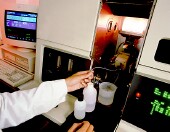Replacement Bladder Grown From Body's Own Cells
'Neo-organ' from intestinal tissue could offer therapy option for cancer patients.
|
E-mail this article
Subscribe to news
Printer friendly version
|

(SOURCE: American Urological Association, news release, May 18, 2008)
SUNDAY, May 18 (HealthDay News) -- Using regenerative medical techniques, it may be possible to create replacement bladders for people who've had their bladder removed due to cancer.
That's the conclusion of U.S. researchers who tested this approach in large mammals.
Replacement bladders made from intestinal tissue have proven successful but can cause a number of complications, such as chronic urinary retention, hematuria and infection, according to the researchers from Tengion Inc., in Winston-Salem, N.C.
A potential new option is the use of a patient's own cells to grow a replacement bladder.
Here's how it works: Bladder progenitor cells are harvested from the patient, grown in culture and seeded on a biodegradable bladder-shaped scaffold made from collagen and/or polyglycolic acid. This "neo-organ" is then implanted in the patient, the researchers said.
This technique was tested on 14 large mammals. Within six months, the structure and pharmacological characteristics of the neo-bladder were similar to the original bladder. The researchers said they saw no evidence of abnormal tissue development, immune response, or systemic response to the neo-bladder regeneration.
The results suggest that the new bladder had successfully and safely regenerated, the researchers said. The study was to be presented May 18 at the annual scientific meeting of the American Urological Association, in Orlando, Fla.
"This treatment option essentially regenerates the patient's own bladder, reducing the risk of rejection and the need for immunosuppressant drugs. If successful in human clinical trials, patients should expect to regenerate normal bladder structure and function," researcher Dr. Timothy Bertram said in a prepared statement.
More information
The B.C. Health Guide has more about bladder removal. 
Copyright © 2008 ScoutNews, LLC. All rights reserved. 
HealthDayNews articles are derived from various sources and do not reflect federal policy. healthfinder.gov does not endorse opinions, products, or services that may appear in news stories. For more information on health topics in the news, visit the healthfinder.gov health library.